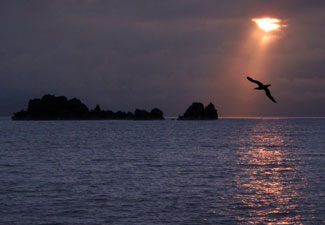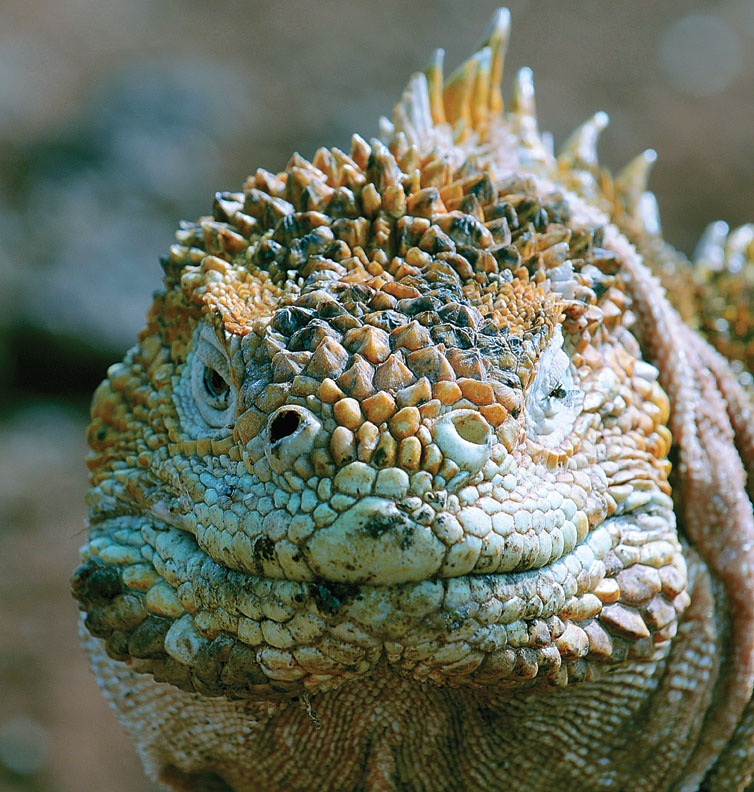Snorkling with Darwinby Dan Rogers |
| Printer-friendly version | Email this article |
|
"Amazing discoveries—some cultural, some scientific."
"These are things I never even dreamed of doing."
Read the journal and Web log entries of the 12 Wabash students who accompanied Professor of Biology David Krohne and me for two weeks studying evolution and ecology in the Amazon rainforest and Galapagos Islands, and you can’t miss the impact this immersion trip had on their education and lives. Photo Album
Of course, swimming with sharks, witnessing the life-and-death struggles of baby sea turtles, taking canopy walks 130 feet over the rainforest floor and falling asleep each night to the bellow of howler monkeys ought to leave an impression.
But the true alchemy (as Professor Paul McKinney might have said) of this year’s Wabash Summer Study in Ecuador program began long before we set foot on a dugout canoe in the Amazon or stepped off the plane in the Galapagos. It’s a way of moving through the world I’ve seen in our students before, but never so clearly as on the Estrella del Mar, the boat that was our research base and home for eight days last June.
When the Wabash group arrived at Puerto Baquerizo Moreno on the Galapagos Islands, the boat wasn’t quite ready for us. To pass the time while the crew provisioned and readied the boat, our guide took us to a local restaurant for a quick meal of fish ceviche, a local delicacy. The outdoor caf™ overlooked the deep blue water of the bay—a tourist scene as perfect and clich™d as one could imagine.
As we waited to be served, I noticed some vacationers seated across from us. This tanned and laughing party was the group that had just disembarked from the very boat we would call home for the next eight days. And a happy group they were, joking with the guide and wait staff in boisterous tones.
While certainly not overtly disrespectful, they were tourists in every sense of the word. Having lived in Ecuador and traveled extensively among Ecuadorians, I could read the familiar expressions of the manager, wait staff, and guide. To their Ecuadorian hosts, the outgoing group was one more segment in the endless procession of tourists who had to be shuttled on and off boats, fed and coddled, herded, and sent off with pleasant memories and photos of one of the most ecologically diverse places on earth.
While I knew our group of students was in for an amazing trip, I’ve been running the Wabash Ecuador program long enough now to know that our Ecuadorian boat crew was also in for a unique experience.
When I travel abroad with our students, I am always highly attuned to the reactions of our hosts. Being fluent in Spanish helps, and I love to look for the moment when our guides realize that Wabash students aren’t just another troupe of wet-behind-the-ears tourists.
You can call the students in our Ecuador program many things (and I’ve used my share of epithets over the years), but you can’t call them tourists. They work too hard, study too hard, and engage the culture earnestly in Spanish.
During those days on the boat, we witnessed some amazing sights: sea lions by the score, sharks and manta rays, blue-footed boobies, and Darwin’s ubiquitous finches. Our guide spoke flawless English and was well prepared with the details. With Professor Krohne there to fill in the broad strokes from an ecological/evolutionary perspective, the biology portion of the trip was absolutely unparalleled.
But the learning didn’t stop when we returned to the boat after our hikes on the islands or snorkeling in the bays. As the week progressed, I began to notice more and more conversations between our students and the boat’s crew; conversations that brought the separate disciplines our students study into particular focus.
With the exception of our guide, the crew—including the captain, firstmate, and cook—spoke little, if any, English. Yet halfway through the week, students began to tell David and me things they had learned in conversations with the crew.
They learned that our cook, Francisco (a vigorous septuagenarian whose nickname is Pancho), had known Peter and Rosemary Grant—the most famous contemporary field biologists to have worked in the Galapagos. Their story is detailed in Jonathan Weiner’s The Beak of the Finch, one of the texts our students read last spring in preparation for the program and a must-read for anyone interested in the Galapagos.
Pancho, the students learned, had helped with logistics for the scientists, delivering food and supplies to the tiny remote island of Daphne that was home to their research station. Pancho still keeps in touch with the Grant’s children (who accompanied their parents during the long stays on the island).
For me, of course, the best part of learning from the cook was that it happened all in Spanish. In fact, given Pancho’s and the others’ English skills, it could have only happened in Spanish.
Immediately before the excursions to the Amazon and Galapagos, our students had participated in two weeks of intensive Spanish courses at the Pontificia Universidad Cat€lica del Ecuador and had lived with host families. The Spanish skills they sharpened—and even more importantly, the colloquialisms and cultural knowledge they absorbed—allowed for much closer interaction with the crew than would otherwise been possible. Because of those two weeks beforehand, our students knew the city of Quito, understood the general political landscape, and knew the names of the major players. They understood some of the "in" jokes, displayed an awareness of Ecuadorian history, loved Ecuadorian food, and appreciated Ecuador’s unique culture.
And of course, they did all of this in earnest, albeit sometimes halting Spanish.
By the end of the week, Pancho was teaching our students how to play the Salsa with improvised instruments. The whole atmosphere of the boat had changed. The polite and helpful, but somewhat distant manner of the crew early in the week had been replaced with music lessons, conversations, and story telling.
I don’t deny that some of this was probably the inevitable result of living, eating, and studying in close proximity with the crew. But the finer details, the high "resolution" of the overall picture could not have happened without the first two weeks of the program in Quito spent in intensive language study and with host families.
In that sense, Wabash Summer Study in Ecuador blends the advantages of a study abroad experience with the close student-faculty rapport that is the hallmark of the Wabash experience. Many schools run immersion courses and many students participate in study abroad programs. But there’s an important distinction between the two—a distinction we try to blur.
We are a strange hybrid: an extended immersion trip or a short study abroad experience. Students live and breathe Ecuadorian culture for an entire month. They have Ecuadorian professors and get to know other Ecuadorian students their own age. But they also get to work and travel with fellow Wabash students and their own faculty during the last two weeks of the program. As important, the work they do during these last two weeks is an extension of a Wabash College course they’ve taken in the spring semester.
The real payoff comes in the relationships that students form: relationships with each other, their professors, host families, Ecuadorian university students, and cooks like Pancho. The learning that happens in the program enables the change in atmosphere we saw on the boat. We watched Wabash students transcend linguistic and cultural boundaries to learn about their subject in ways that are impossible to imagine in the classroom.
And unlike the group that preceded us on the Estrella del Mar in the Galapagos, our students were travelers and learners, not tourists.
Dan Rogers is Professor of Spanish and Chair of the Department of Modern Languages at Wabash. He founded and directs the College’s Wabash Summer Study in Ecuador Program.
|

 "Sheer ecstasy—with a touch of fear."
"Sheer ecstasy—with a touch of fear." Having our cook add details to one of the texts we’d read was wonderful and surprising. His descriptions of the deprivations and difficulties the Grants suffered helped our biology students better understand the sometimes harsh realities of professional field work in their chosen discipline.
Having our cook add details to one of the texts we’d read was wonderful and surprising. His descriptions of the deprivations and difficulties the Grants suffered helped our biology students better understand the sometimes harsh realities of professional field work in their chosen discipline.